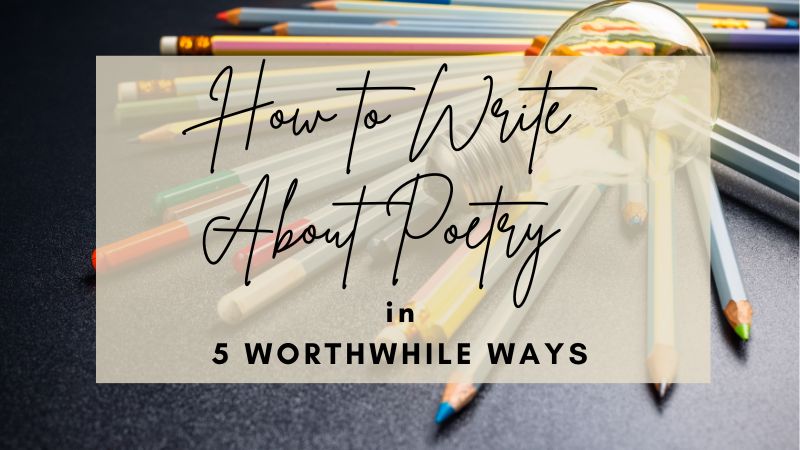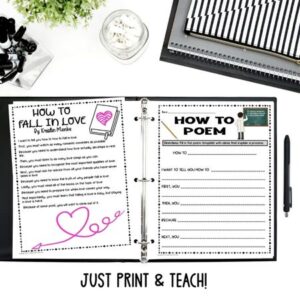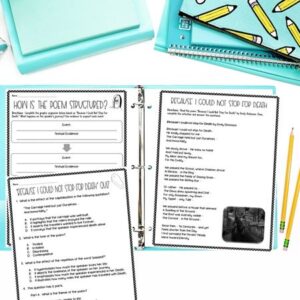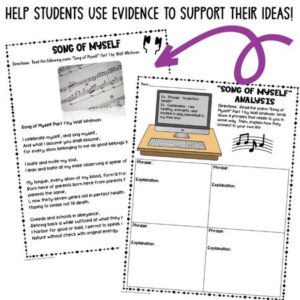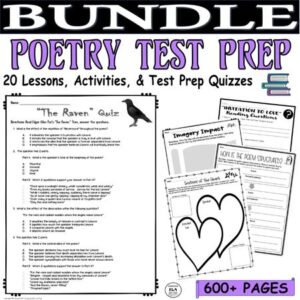Have you ever tried to read poetry on your own for FUN? Try asking this question to a bunch of middle and high school students in a typical English class…You will probably get blank stares or smirks in response. Now, ask those same students if they know how to write about poetry. Most likely you will receive the exact same responses, now coupled with fear, anxiety, and/or apathy.
And that is okay. Poetry is difficult to understand line by line or stanza by stanza, let alone respond to it in some way. The act of poetry analysis is becoming a thing of the past as schools tend to push short stories and informational articles rather than high-level poetry and literature.
I would argue that comprehending and examining poetry from free verse to sonnets to nursery rhymes is even more important for today’s generation as they are inundated with language from dawn until dusk. Creative, yet tricky ads, persuasive jingles, political mantras, popular music, and even podcasts are filled with poetic devices and higher-level language concepts many adults either ignore or disregard while listening.
So if you need help with teaching your students how to write about poetry, keep on reading!
Need help with Test Prep? Check out this FREE Pack of 3 Test Prep Activities to help students achieve success on standardized tests!

How to Write About Poetry in 5 Worthwhile Ways
1. Journal About It.
I love the concept of journaling, and I have journaled about many things at various times in my life. It helps me to reflect and think critically about something, to flesh it out by writing down my thoughts that are oftentimes muddled. The results are typically messy and nonsensical, but at least I have some ideas now.
If you want to encourage your students to learn how to write about poetry, journaling can be a gateway into deeper analysis.
TYPES OF QUESTIONS TO HELP STUDENTS GET STARTED AS THEY LEARN HOW TO WRITE ABOUT POETRY:
- What is a word or line from the poem that has the most meaning to you?
- What is the topic of the poem and how do you know this?
- Why might the poet have used this specific title?
- How does the poem start and end?
- What do you think the poem means and why?
- What are your thoughts on what the poem is trying to say?
- What message/theme from the poem do you think could apply to you in some way?
Students don’t need a ton of time. Some might write 3 sentences; others might write a page. Both are okay!
The goal is to activate thinking about poetry!
Want to teach Walt Whitman’s “Song of Myself” in a fun and engaging way? Click below!
2. Review The Poem.
All of us like different things, and this truth applies to the process of how to write about poetry as well. Plus, there are SO MANY types of poems out in the world of literature, and even if poems focus on a similar topic, they can have a different impact, style, or diction!
Here are some poems centered on the topic of death:
- “We Real Cool” by Gwendolyn Brooks
- Sonnets by Shakespeare
- “The Passerby” by Kristin Menke
- “Fire and Ice” by Robert Frost
- “Because I could not stop for Death” by Emily Dickinson
Why not take the time to give students a quick assessment through a poem review? You could ask the following questions:
- How would you rate each poem? (stars, thumbs up, etc.)
- Why would you give each poem that rating? Explain with specific reasons/examples.
- Which poem was your favorite and why? Explain in 2 sentences.
- Which poem was your least favorite and why? Explain in 2 sentences.
Students don’t have to spend hours writing an essay to prove they know how to write about poetry!
3. Write a Response Poem.
When many students are learning how to write about poetry, they think they will have to summarize the poem or discuss devices. Instead of a reading comprehension paragraph, you could let students respond to the poem with their own poetry.
Here are several ideas students could consider as they respond:
- Write about a similar topic.
- Write to the author.
- Write an argument against the poem.
- Rewrite the poem in a different format: limerick, haiku, sonnet, free verse, etc.
- Change up 10 words in the poem and write about the difference they make.
The more options we give students, the more fun they will have as they practice how to write about poetry!

4. Pick Apart the Devices.
As a part of delving into how to write about poetry, we MUST teach our students about poetry elements as we employ these elements without even thinking on a daily basis! Rather than assigning a whole paper on poetic devices, you could encourage students to explore 1 or more specific devices independently, in pairs, or in small groups.
You might include the following:
- Write the definition.
- Examples from a poem.
- Create other examples.
- Explain why the poet might have included the element.
- Connect to ads, poems, movies, etc. that use the element.
- Present to the class in some way.
In terms of a visual format, students could use a poster, PowerPoint, or online slides. It is really up to you! The flexibility is what makes teaching how to write about poetry a bit less daunting!
Want help with teaching poetic sound devices? See below!
5. Explore a poem’s history.
I am NOT a huge fan of reader response theory when it comes to understanding a poem and its meaning. For example, if you read “To My Dear and Loving Husband” and believe it is a satire and therefore critical of marriage, you would be, well, wrong! Or if you read Edgar Allan Poe’s “The Raven” and believe he wrote it for people who celebrate Halloween, well, not really.
Exploring the history of a poem will help students think more critically as they learn how to write about poetry analytically!
HERE IS A MINI-PROJECT IDEA:
- Choose a poem.
- Research the author: name, birth/death, family history, education, lifestyle, etc. (List 5 important facts from a cited source.)
- Research the time-period: what major events occurred during the time the poem was written? (List 5 important events from a cited source.)
- Explore other artistic forms from the same time-period: paintings, novels, songs, other poems, etc. (List 5 pieces of art from a cited source.)
- Present the project to another classmate, a small group, or the whole class, or do a Gallery Walk of projects!
Integrating the process of teaching how to write about poetry with other skills will help our students as they navigate the world around them. A poem taught in isolation teaches many students that poetry is irrelevant, so connecting the poem to research, other forms of writing, presentation skills, etc., is vital!
How to Write About Poetry Resources:
Do your students need help with poetry analysis? This POETRY TEST PREP ULTIMATE BUNDLE contains 20 EASY-TO-TEACH Lessons, ENGAGING Reading Comprehension Activities, and STEP-BY-STEP Writing Responses! It includes quizzes that mimic standardized tests with QUESTIONS and ANSWERS (for 20 poems including “A Poison Tree,” “Annabel Lee,” “I Hear America Singing,” “The Raven,” “I Wandered Lonely as a Cloud,” etc.) based on the Common Core Reading standards!
Need more fun ideas for teaching poetry? Check out my store Kristin Menke-Integrated ELA Test Prep!

